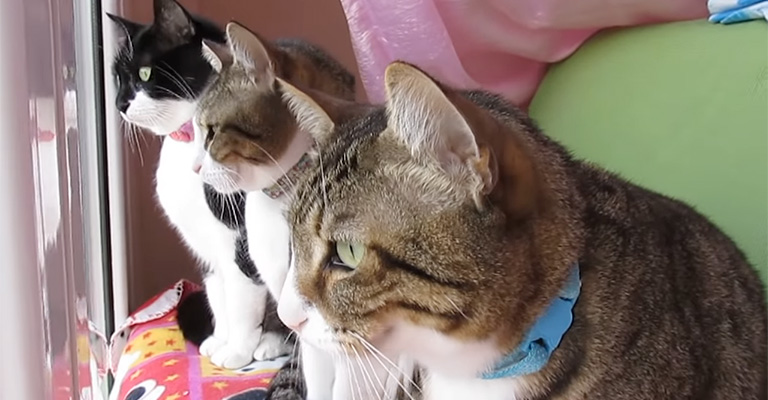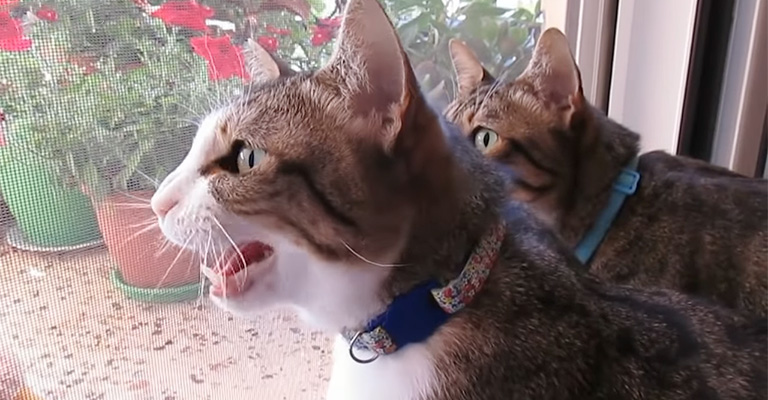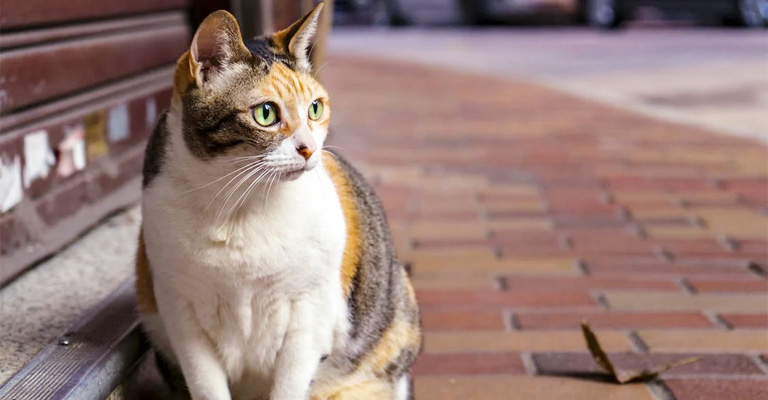Cats are known for their curious and playful nature, often displaying intriguing behaviors that captivate their human companions. One such behavior is chirping at birds, a sound that resembles a mix of a trill and a meow.
But why do cats chirp at birds? Is it a form of communication, a hunting instinct, or simply a display of frustration? In this article, we will delve into the fascinating world of feline behavior to understand the reasons behind this peculiar chirping phenomenon.
By exploring the instincts, predatory nature, and communication patterns of cats, we hope to shed light on this intriguing behavior and provide insights into the complex relationship between our feline friends and their feathered neighbors.

Why Do Cats Chirp at Birds?
Cats chirp at birds as a natural instinctive behavior. Chirping is often observed when a cat is watching birds or other small prey animals, such as squirrels or insects, from a window or outside. There are a few reasons why cats chirp at birds:
Hunting Behavior
Cats are natural predators, and chirping is a way for them to express their excitement and anticipation when they see potential prey.
It’s similar to the chattering sound they make when they’re hunting and trying to mimic the sounds of birds or small animals.
Excitement
Chirping can also be a sign of frustration or excitement. Cats may chirp when they are unable to reach the birds, such as when they are indoors or behind a window. It’s their way of expressing their desire to hunt and capture the birds.
Communication
Chirping can also serve as a form of communication between cats and their owners. Some cats chirp when they see birds as a way to get their owner’s attention or to communicate their excitement.
Mimicking Bird Sounds
Cats are known for their ability to mimic sounds, and chirping can be a way for them to imitate the sounds of birds. By chirping, they may be trying to communicate with the birds or attract their attention.
Frustration Release
Chirping can also be a way for cats to release their frustration or pent-up energy. When they see birds but are unable to physically reach them, chirping allows them to express their excitement and release some of that built-up energy.
Prey Communication
Chirping can serve as a form of communication between cats that are hunting together.
When cats are in a group or hunting in pairs, chirping can help them coordinate their movements and communicate their intentions to each other.
Social Behavior
Chirping can also be a social behavior exhibited by cats. Some cats chirp at birds as a way to engage their owners or other cats in play. It can be a form of invitation to interact or a way to express their enjoyment of the bird-watching experience.
It’s important to note that chirping is a natural behavior for cats and shouldn’t be discouraged.
However, if your cat becomes overly fixated on birds or shows signs of aggression, it’s a good idea to redirect their attention to more appropriate toys or activities to prevent any potential harm to the birds.
Is Cat Chirping at Birds Concerning?

Chirping is a common behavior observed in cats when they are watching birds or other small prey animals. While chirping itself is not usually a cause for concern, there are a few factors to consider when evaluating your cat’s behavior. Here are some points to keep in mind:
Natural Instinct
Chirping is a natural instinctive behavior for cats. It is a way for them to express their excitement and anticipation when they see potential prey.
Cats are natural predators, and chirping is often accompanied by other hunting behaviors such as crouching, tail twitching, and dilated pupils.
As long as the chirping is not excessive or accompanied by signs of distress, it is generally considered normal behavior.
Frustration and Aggression
While chirping is usually harmless, it can sometimes be a sign of frustration or aggression.
If your cat becomes fixated on birds and displays signs of intense frustration, such as growling, hissing, or aggressive body language, it may be a cause for concern.
This behavior could indicate that your cat is becoming overly stressed or agitated, and it’s important to redirect their attention to prevent any potential harm to the birds or themselves.
Obsessive Behavior
If your cat’s chirping at birds becomes obsessive or compulsive, it may be a sign of underlying issues.
Cats that excessively chirp, vocalize, or display repetitive behaviors may be experiencing anxiety, stress, or boredom.
It’s important to assess your cat’s overall behavior and well-being to determine if there are any underlying factors contributing to the excessive chirping.
Environmental Enrichment
Cats that chirp at birds may benefit from increased environmental enrichment. Providing your cat with interactive toys, scratching posts, puzzle feeders, and opportunities for play and exercise can help redirect their focus and energy.
Engaging your cat in interactive play sessions using toys that mimic bird movements can also be a great way to satisfy their hunting instincts.
Window Safety
If your cat chirps at birds from a window, it’s crucial to ensure their safety. Cats can become overly excited or frustrated when watching birds, and they may attempt to jump or paw at the window.
Make sure your windows are secure and consider using window screens or window perches to provide a safe viewing area for your cat.
Distraction Techniques
If your cat’s chirping becomes problematic or disruptive, you can try using distraction techniques to redirect their attention.
For example, you can provide them with interactive toys, engage them in play sessions, or create a bird-watching area with a bird feeder outside the window.
This can help redirect their focus and provide a more appropriate outlet for their hunting instincts.
Consult a Professional
If you are concerned about your cat’s chirping behavior or if it is accompanied by other concerning signs such as aggression, excessive vocalization, or changes in appetite or litter box habits, it’s advisable to consult with a veterinarian or a qualified animal behaviorist.
They can assess your cat’s behavior, rule out any underlying medical conditions, and provide guidance on managing or modifying the behavior if necessary.
Chirping at birds is a natural behavior for cats, but it’s important to monitor your cat’s behavior and ensure their well-being.
While chirping itself is usually harmless, excessive chirping, signs of aggression, or obsessive behavior may warrant further attention.
By providing appropriate environmental enrichment, ensuring window safety, and seeking professional advice if needed, you can help ensure a happy and healthy relationship between your cat and its bird-watching instincts.
How to Encourage Cat Chirping?

If you want to encourage your cat to chirp at birds, here are a few tips:
Provide Bird-Watching Opportunities
Set up a bird feeder or birdhouse near a window where your cat can observe birds. This will give them a chance to see birds up close and stimulate their natural hunting instincts. Make sure the window is secure and safe for your cat to watch from.
Interactive Toys
Engage your cat in play sessions using interactive toys that mimic bird movements. Toys with feathers, strings, or small objects that resemble birds can be enticing for your cat and encourage them to chirp and engage in play.
Sound Stimuli
Play recordings of bird sounds or nature sounds in the background. This can create a more immersive environment for your cat and enhance their bird-watching experience. There are even apps and websites available that provide a variety of bird sounds.
Positive Reinforcement
When your cat chirps at birds, provide positive reinforcement by praising them, petting them, or offering treats. This will associate the chirping behavior with positive experiences and encourage them to continue chirping.
Interactive Playtime
Spend dedicated playtime with your cat using toys that encourage hunting and chasing behaviors.
This can help satisfy their natural instincts and provide an outlet for their energy. Engaging in interactive play sessions can also strengthen the bond between you and your cat.
Cat TV or Videos
Consider playing cat TV or videos specifically designed for cats. These videos often feature birds, squirrels, or other animals that can capture your cat’s attention and stimulate their hunting instincts.
You can find such videos on platforms like YouTube or through specialized cat entertainment apps.
Outdoor Enclosure
If it’s safe and feasible, consider providing your cat with access to an outdoor enclosure or a catio. This will allow them to experience the sights and sounds of nature while remaining protected from potential dangers. Being in a controlled outdoor environment can enhance their bird-watching experiences.
FAQs
Yes, most cats have the ability to chirp at birds. It is a natural behavior for them.
Chirping is a specific vocalization cats use when they are excited or trying to mimic the sounds of birds. Meowing is a more general form of communication.
Not all cats chirp at birds. Some cats may not show much interest in birds or may have different ways of expressing their excitement or hunting instincts.
Chirping at birds is typically not a sign of aggression. It is more commonly associated with excitement, anticipation, or frustration.
You cannot directly train a cat to chirp at birds, as it is a natural behavior. However, you can create an environment that encourages bird-watching and provides opportunities for your cat to engage in their natural hunting instincts.
Bottom Line
The chirping behavior exhibited by cats when they encounter birds is a fascinating aspect of their natural instincts and communication patterns.
Through their chirping, cats may be expressing their predatory instincts, attempting to communicate with the birds, or simply displaying their frustration at not being able to reach their feathered friends.
While it may be entertaining to observe cats chirping at birds, it is important to remember that birds are living creatures deserving of respect and protection.
By gaining insight into the reasons behind cats chirping at birds, we can deepen our understanding of their behavior and strengthen the bond we share with our beloved feline companions.
So, the next time you witness your cat chirping at a bird, take a moment to appreciate the intricate instincts and communication skills that make our cats such fascinating creatures.